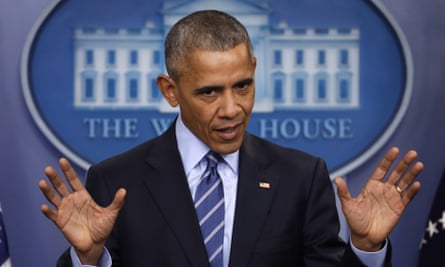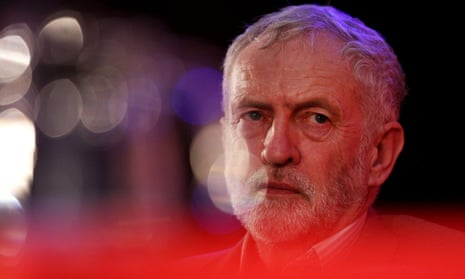A spokesman for Jeremy Corbyn has hit back after Barack Obama appeared to suggest that the Labour party has moved away from “fact and reality” and is disintegrating.
The spokesman said the Labour leader “stands for what most people want” and suggested that the outgoing president’s Democratic party needed to “challenge power if they are going to speak for working people”.
Obama had earlier said he was not worried when asked if the Democrats could undergo “Corbynisation” and “disintegrate” like Labour following Hillary Clinton’s election defeat by Donald Trump.

The departing US president was giving an in-depth interview, in which he also said he would have won the 8 November contest if he had been able to run for a third term, to David Axelrod, formerly an adviser to Ed Miliband, Corbyn’s predecessor as Labour leader.
Obama, 55, compared the way Labour and the US Republicans had chosen to move from the middle ground and claimed that even the leftwing senator Bernie Sanders was a centrist compared with Corbyn.
Asked about a potential Corbynisation of his party, he said: “I don’t worry about that, partly because I think that the Democratic party has stayed pretty grounded in fact and reality.“[The Republican party] started filling up with all kinds of conspiracy theorising that became kind of common wisdom or conventional wisdom within the Republican party base. That hasn’t happened in the Democratic party. I think people like the passion that Bernie brought, but Bernie Sanders is a pretty centrist politician relative to ... Corbyn or relative to some of the Republicans.”
In response, Corbyn’s spokesman said: “Both Labour and US Democrats will have to challenge power if they are going to speak for working people and change a broken system that isn’t delivering for the majority.
“What Jeremy Corbyn stands for is what most people want: to take on the tax cheats, create a fairer economy, fund a fully public NHS, build more homes and stop backing illegal wars.
“For the establishment, those ideas are dangerous. For most people in Britain, they’re common sense and grounded in reality.”
The Labour leader has been critical of the Democrats’ policies. In February, Corbyn said he opposed “dangerous elements” in the negotiations for the transatlantic trade and investment partnership (TTIP). The secretive bilateral trade deal between the EU and US has been maligned for apparently putting corporate interests above national sovereignty.
Corbyn, who met Obama in London for 90 minutes in April, also opposes British military intervention in Syria. The meeting, described as “excellent” by the Labour leader, was announced just as Obama said the US and Britain were ready to take action to stop Islamic State securing a stronghold in Libya.
A Labour spokesman said after the meeting: “They discussed the power of global corporations, the impact of globalisation on working people and the need to take action to reduce inequality across the world.
“They agreed on the case for Britain to remain a member of the European Union, and that there would be further contact between their teams to discuss measures to deal with international tax avoidance and evasion.”
Despite Obama’s comments, Corbyn is secure in his position leading Labour after seeing off a challenge by Owen Smith this autumn, which was triggered by a mass resignation of his shadow cabinet. He has since put together a shadow cabinet with closer allies in senior roles, such as Diane Abbott as shadow home secretary and Emily Thornberry as shadow foreign secretary.
In the new year, strategists are planning to pitch Corbyn as a leftwing populist as they prepare for the possibility of an early general election and a tricky byelection in the marginal northern seat of Copeland, prompted by the resignation of the Labour MP Jamie Reed.
On Tuesday, Ken Loach, the filmmaker who set up the Left Unity party, described Labour MPs who continue to oppose Corbyn as a “bunch of political losers”. In a letter to the Guardian, he criticised MPs unhappy with Corbyn’s leadership, suggesting they should be labelled rightwing rather than moderate.
“Any disarray or disunity in the party is the responsibility of those MPs. They attack Corbyn and John McDonnell day after day, refusing to promote party policy on jobs, housing, transport or the NHS, the core concerns of those they should represent,” he wrote.
“They offer no support, in parliament or outside. Worst of all, they show contempt for the hundreds of thousands of new members, mainly Corbyn supporters, who have made Labour the largest political party in Europe. This bunch of political losers are intent on the destruction of a Labour party they cannot control.”

Comments (…)
Sign in or create your Guardian account to join the discussion